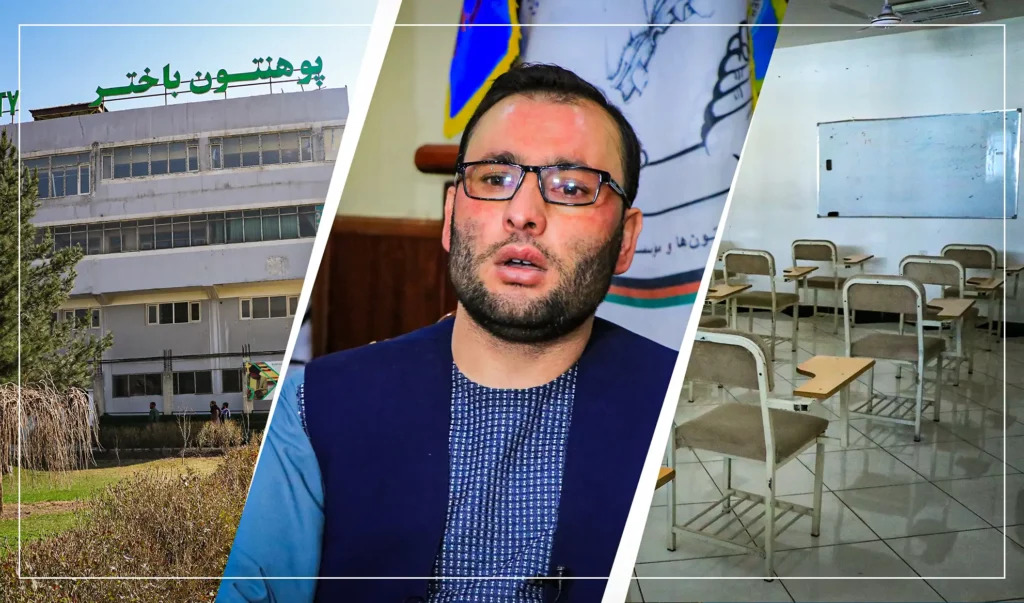KABUL (Pajhwok): Some private universities have been faced with financial crisis and if the situation remained as it is a number of private universities may be closed, according to the Private Universities Union (PUU) on Thursday.
Earlier, the Ministry of Higher Education (MoHE) had said that efforts were underway to address the financial issues faced by the universities.
Mohammad Karim Nasiri, spokesperson of the PUU, told Pajhwok Afghan News a total 140 private universities and institutions were functional nationwide adding that all these universities faced with financial crisis after government decision to halt girls higher education till the next order.
He said the Afghanistan University has been closed in Kabul while the Albarz University is closed in Balkh province and if the situation remained the same more private universities will be closed.
He added of the total 67 private universities and higher education institutions up to 35 were faced with financial crises which may be closed sooner than later.
He said private universities produced graduates while a small number of them were recruited for jobs.
Nasari said during meetings with officials they shared their concerns and positive decision had been reached but there was need for the implementation of these decisions.
He demanded the Islamic Emirate of Afghanistan (IEA) government to wave off private universities taxes and allowed girls to go to universities.
He also demanded waving off the rent of private universities functional in government buildings and allow banks to provide loan to private universities.
Nasari said 70,000 girls were busy studying in private universities who are now at home and most of these students owed tuition fees to the universities.
He added these universities paid 800 million afs tax to the government annually and after its closure it will have negative impact on the government system and education.
Nasari said one of the past 20 years of achievement was the promotion of private sector higher education which played positive role in the development of Afghanistan and if this sector was not support any more Afghanistan will witness losses in education sector.
Fathullah Babokrkhel, the founder of Mashal University said the engineering, computer science; law and political science, journalism and economy faculty were opened in the university in which around 1,800 students were imparted higher education by 80 teachers.
He added before political changes in the country 4,800 students were studying in Mashal University, including 1,800 girls.
Babokarkhel said after regime change majority of the students did not appeared for their studies and only 180 students came to attend their studies.
He said the major blow to the higher education sector came after the halt of girls education till the next order.
Comparing to the past, he said 50 percent administration and teachers strength had been downsized.
Babokarkel said they held meetings with the government regarding the resolution of existing problems who also assured to solve them. The government assured to support private universities in the payment of their electricity bills and taxes but these promises have yet to be materialized.
Dr. Ziaullah Shafiq, assistant director students affairs of Melli University, said they had nearly 1,800 students in four faculties but due to regime change a large number of their female students — 980 — could not attend the university.
“Private universities in urban areas have more female students and after the halt of women education private universities suffered financial blow and faced serious problems,” he said.
He said the matter has affected universities financially and it is natural when a large number of students are stopped from attending the universities it would definitely cause problem, he added.
Mohammad Khawani Himmat, head of the Bakhtar University’s journalism faculty, said one of the past 20 years achievement was the growth of higher education and currently a large number of universities existed in Kabul.
He added the only source of universities was the tuition fee the students pay and after the deteriorated economic situation the number of private university students had declined.
“The number of students was declining and after each semester the number of student declines,” he said.
Himmat said the number of female students in Kabul was larger compared to provinces and ban on their education have had a major impact.
Hafiz Ziauddin Hashami, spokesperson for the MoHE, earlier told Pajhwok Afghan News after temporary ban on women education and complaints emerged from private universities the MoHE tasked a delegation to investigate the problems faced by private universities.
“The leadership of the MoHE promised private universities owners to address and cooperate with them in the resolution of the problems faced by them,” he said.
Ghulam Mujtaba Pirzada, one of the students of a private university, said their studies were going on well and hoped that women will be also allowed to go to universities.
nh







GET IN TOUCH
NEWSLETTER
SUGGEST A STORY
PAJHWOK MOBILE APP